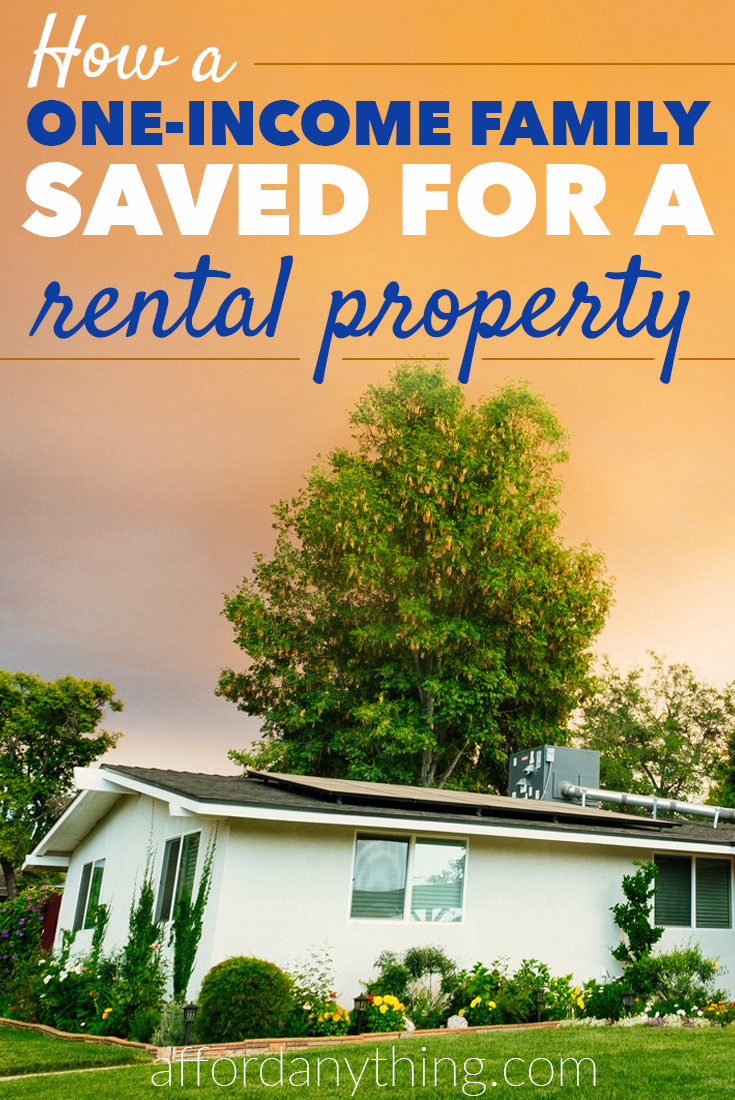
Myth: If you’re supporting 5 people on 1 income (and it’s not a high income), you’re screwed. You’ll never become a business owner or an investor. You’ll be lucky just to pay the bills.
Fact: Ladies and gentlemen, meet success story: Rental Randy.
In my last blog post, I re-emphasized that the best way for two-income couples to turbocharge their savings and investments is to live on one persons’ income, and save 100 percent of the others’. Live like you’re a one-income couple.
This led to a great follow-up question: What if you’re already a one-income family? Specifically, what if you’re a family of 4 or 5, living on one income? What then? (And what if you’re single — a “family of 1” living on one income?)
Here to answer that question is an Afford Anything reader named Randy, who supports his family of 5 on a single income … and still bootstrapped his way to becoming a successful real estate investor.
Here’s his story, in his own words, completely unchanged / unedited:
Five People, One Income, and Two Years of Savings
I have three children and did not buy my first income property until after my youngest was born. My wife does not share my drive to prepare for our future, which means she does not contribute financially to this cause. I pay the majority of the family bills and I do not have a high paying job. Still, I managed to save enough to get my first property. It took two years of saving every dime (literally) I could.
I have an unconventional life and job and work odd hours so I could be a stay-at-home Dad and primary caregiver for our children. It means I have to live off 4-6 hours of sleep a night and be a walking zombie some days, but that’s okay. I did it primarily so our kids would have a parent looking after them and not a day care employee, but I can’t lie and say the money saved wasn’t a small part of that choice.
You have to start. Just start.
One year, I decided to open a Rental House savings account at my bank. I started with about $25. Every chance I got, I deposited money in that account. Tax return? (having a mortgage and three kids helps there) Straight into the Rental House account. Xmas Gift money? Sorry kids and wife, but no big ticket gifts this year or the next. That money’s going straight into the Rental Home account. Friends want to meet at the local bar/restaurant and have fun? Sorry guys, I can’t go out until I buy an investment property. That’s $30 into the Rental House account.
I didn’t choose to buy a home that was outside my budget — say, the type of home/neighborhood you or I might choose to raise our children. That would be setting myself up for failure. Besides, it offers a sort of built-in excuse for not accomplishing my goal. I chose a price point that worked for me, went to the real estate websites, and searched for properties I could afford.
Then, after I’d saved a few thousand dollars, I went to my bank and asked how much money they would loan me. Remember, I don’t make a ton of money. I was disappointed when the bank offered $10,000 less than I wanted. No problem. I lowered my Rental House budget and kept searching. I found a property that needed a little bit of repair. Between the money I’d saved and the bank loan, I bought the property, fixed it up, and had it rented in two months.
I don’t view the rental income as “income”. It all goes to paying down the debt. The sooner I pay it down, the sooner I can buy more properties. Both my homes are owned free and clear, though I have a few thousand to pay back on a line of credit I used to help fix the second property. Also, I have a bank lined up to provide a HELOC on one of my rental houses. I will use that money (and some of my own savings) to buy my next property.
It can be done. You just have to start. Now. You don’t need a detailed plan initially. Just start saving. Now.
Savings Happens in Small Increments
Boom! Drop the mic!
That was awesome. Thank you, Randy, for sharing your story with the Afford Anything community. You rock.
Here are some key takeaways from Randy’s story:
#1: Savings Happens in Small Increments.
It’s tempting to get shell-shocked by a large number. “I need to save $12,000? How on earth can I come up with that?”
But savings unfolds in tiny increments. You save $10 or $20, again and again, until you reach your Mega-Number-Goal.
(It’s like burning calories — you burn an extra 50 calories here, an extra 70 calories there. And pretty soon, these tiny increments have added up to 3,000 calories, and you’ve lost 1 pound.)
(Or, conversely, you nibble on an extra 40 calories here, an extra 80 calories there, and soon you’ve gained 1 pound.)
When people say that they can’t trim their budget any further, my response is:
- Do you buy red meat, like beef or pork? Swap it with beans/lentils or possibly chicken, and you’ve lowered your grocery bill by $20 – $60+ per month.
- Do you pay someone to cut your hair? Start trimming your own, and you’ll save $10 – $50 per haircut, depending on the “caliber” of salon you’ve been frequenting.
- Do you buy orange juice, cheese, and other packaged foods? I love juice, and I used to buy a ton of it. But when I was saving for my round-the-world trip, I knew I needed to cut back. Each time I shopped, before I hit the checkout aisle, I’d put back any juices in my cart and devote that money to my Travel Fund. (I literally kept an envelope with me, marked “Travel.”) That meant I saved an extra $6 each time I hit the store — about $24 per month, or $288 per year. (And these days I make my own fresh juices / smoothies at home.)
There are always ways that you can save more. Remember: there’s a difference between “I can’t” vs. “I choose not to.”
#2: Your Goal is Investing (Earning), Not Saving
Frugality is the first step — not the last.
Nobody penny-pinches their way to wealth. If that were possible, the most miserly, cheapest SOB’s would be billionaires. But they’re not.
Instead, the (self-made) millionaires in our society are the people who build valuable businesses and invest in cash-flow machines. That’s where you focus needs to stay.
Frugality is a means to an end; it’s the method by which you raise your initial investment money — your “seed” money. But you can’t stop there; you need to move to the next step.
Notice that Randy didn’t penny-pinch … and then let his money fester in a savings account. Instead, he bought an asset which will give him monthly cash flow for the rest of his life.
#3: Reinvest Your Profits
Here’s where the magic really happens:
Randy will reinvest the equity from Rental House #1 (plus his “day job” income) to buy Rental House #2. And I’m betting that he’ll use the equity/cash flow from Rental Houses #1 and #2 to purchase #3.
Do you see where this is going?
This is classic “the rich get richer.” Instead of spinning around on the time-for-money-exchange (known as a J-O-B), you create profits — and use those to create more profits.
After a few cycles of this, Randy won’t need to use his “day job” income to buy houses anymore, and he won’t need to appeal to banks. Instead, his houses will start buying more houses.
And at that point, you’ve really won the game.
